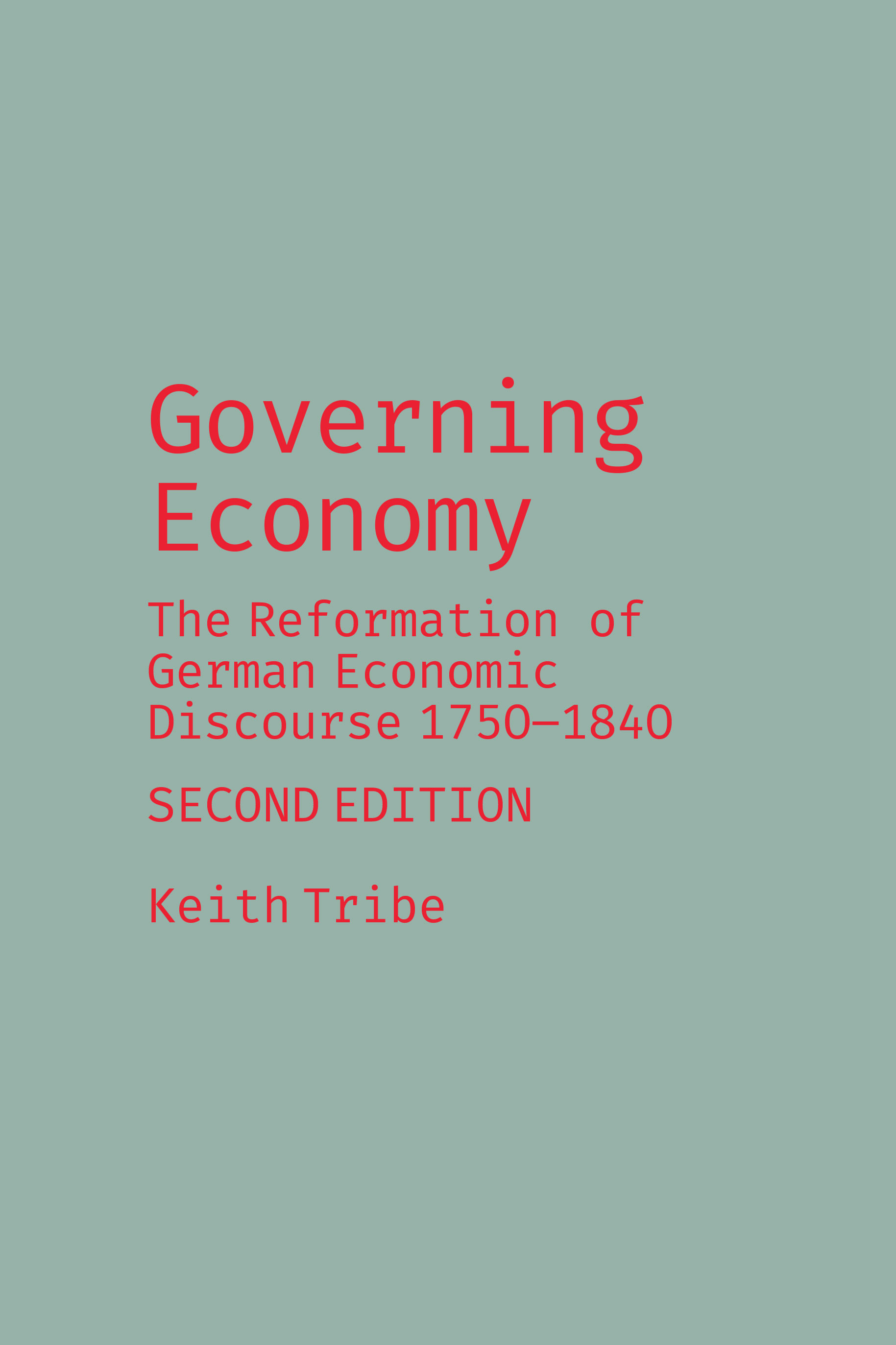





Keith Tribe’s study of Cameralism, first published in 1988, is a classic of intellectual history. Now it is available again in a corrected and completely reset Second Edition.
From the later seventeenth century a new post-Machiavellian discourse of wealth and welfare developed in German territorial states that directly linked the power and wealth of a ruler to the welfare of his people. The power of a ruler was related to the strength of a nation, the latter reliant on prosperous and flourishing subjects. Originally a language of counsel presented in pamphlets and books to rulers and court officials, in the early eighteenth century this language was transformed into a new university science dedicated to the idea that a flourishing state was based on principles of ‘good order’, and that these principles should be taught to young men in a systematic way.
Governing Economy shows how distinctive this new academic discourse was in the European context, demonstrating how its focus upon ‘good order’ dictated the reception of contemporary French, English and Italian political economy. From the 1790s the vogue for Critical Philosophy undermined the older Natural Law foundations of cameralist conceptions of state and society. German economic discourse transmuted into a new doctrine of economic order which, while still conceiving the wealth of a nation as founded upon the activity of a labouring population, now took its point of departure from the needs of an individual located in a ‘civil society’ that had emancipated itself from the tutelage of the state.
Presenting in vivid detail a discourse on economy and polity that today seems quite idiosyncratic, Governing Economy sheds fresh light on the emergence during the early years of the nineteenth century of new conceptions of state and economy, demonstrating how novel such ideas of liberal political and economic order actually were.
 Keith Tribe (seen right as he began writing the book in 1985) is an independent scholar and translator. His recent publications include The Economy of the Word. Language, History, and Economics (Oxford UP 2015); The Contradictions of Capital in the Twenty-First Century (edited with Pat Hudson, Agenda 2016); and his new translation of Friedrich Schiller, On the Aesthetic Education of Man, edited Alexander Schmidt (Penguin 2016). He was born in Purley, South London in 1949, studied at the University of Essex 1968–71, at the University of Cambridge 1972–75, and taught at Keele University from 1976 until his early retirement in 2002.
Keith Tribe (seen right as he began writing the book in 1985) is an independent scholar and translator. His recent publications include The Economy of the Word. Language, History, and Economics (Oxford UP 2015); The Contradictions of Capital in the Twenty-First Century (edited with Pat Hudson, Agenda 2016); and his new translation of Friedrich Schiller, On the Aesthetic Education of Man, edited Alexander Schmidt (Penguin 2016). He was born in Purley, South London in 1949, studied at the University of Essex 1968–71, at the University of Cambridge 1972–75, and taught at Keele University from 1976 until his early retirement in 2002.
Governing Economy is a tour de force from the research point of view and the only truly up-to-date work on the subject.
(ISTVAN HONT, King’s College, Cambridge)
Nearly three decades since it first appeared Keith Tribe’s Governing Economy remains the unrivalled study of Germany’s distinctive tradition of economic analysis from Cameralism through to Historical Economics. It combines acute historical scholarship with conceptual rigour and provides a sharply illuminating contrast to the very different and politically far less explicit trajectory of political economy in Britain or France.
(JOHN DUNN, King’s College, Cambridge)
Governing Economy charts the dramatic reorientation of German economic thinking that took place between the mid-eighteenth and mid-nineteenth centuries. Based on Keith Tribe’s unrivalled mastery of this field, the book remains the most authoritative and compelling study of the German alternative to British and French political economy, and supplies an essential historical perspective on current debates about the role of the state in shaping economic life. This new edition of Tribe’s pioneering work should find a wide readership among those wishing to understand the history of the social sciences and economics, the intellectual foundations of liberalism, and the tension between politics and economics in modern nation-states.
(IAIN McDANIEL, University of Sussex)
Governing Economy provides a perspective upon the work of economic administration and government in eighteenth-century German states as it appears in over six hundred tracts, treatises and textbooks written by German university professors whose task was to teach future administrators and officials. It reflects, therefore, how ‘good government’ was supposed to work; it reconstructs a normative discourse that sought to position university teaching as an essential source of order for the state. As I demonstrate, this was always more aspiration than reality; but by systematically examining the construction of this aspiration we can learn a great deal about the way in which the early modern economy was conceived by its contemporaries.
The book was consciously written against the standard approach to the history of economic discourse by modern economists oriented to conceptions of theoretical novelty, using a modern economic sensibility to appraise past arguments.[1] Instead, I turned to a genre of literature that was, from this perspective, invisible, unrecognisable: organised according to ideas and concepts that no longer existed, with no bearing on modern conceptualisations of economic action, apparently turgid, derivative and very repetitive. By taking this approach I was seeking to make the point that we should make more effort to understand the way in which economic language is actually used; and that, then as now, banal ideas are frequently more influential than those of canonical ‘thinkers’. We should therefore shift our focus away from a concern with originality and invention, to consider the way in which it is distinctly unoriginal and derivative ideas that often become so widely accepted.
By the time the book was published in the summer of 1988 I was developing a new project on the formation and development of the discipline of economics in Britain, like the German work linked to my involvement with Istvan Hont in managing the project on the international institutionalisation of economics that had been launched through King's College Cambridge Research Centre in 1982. My shift to a British context was purely pragmatic: continuing my German studies onwards into the nineteenth century would have involved months, years, in German university libraries, and I now had a young family; while as a member of the Department of Economics at Keele University it seemed advisable to work on material more recognisable to my colleagues. Applying the same approach to the more or less simultaneous and international emergence of economics as a university discipline in the later nineteenth century could, I thought, yield insight into the contemporary assumptions of economic thinking: studying how those assumptions were systematically inculcated in students, and then passed into everyday thinking. By establishing a contemporary baseline for the development of economic training, we might create a historical standard against which historical arguments might be measured. If we could reconstruct the material process of economic education, we would have a permanently evolving historical yardstick against which we could evaluate economic policy and argument. And this yardstick would, again, not represent the most advanced, elaborated, or even ‘best’ ideas of the time, but rather those that were generally accepted and reproduced through textbooks and teaching. The emphasis would fall not on originality, but on the routine reproduction of banal ideas – more a game of Chinese Whispers than the heroic progress of modern science. In turn, this would help us understand how far ‘modern economics’ was part of this same process.
Governing Economy was in general well-received, but predictably its subject matter made it relatively inaccessible. My new project on British economics was helped on its way by a research grant from the ESRC that freed me from teaching during 1988–89, and a Hallsworth Fellowship from the University of Manchester during the academic year 1992–93. Although I wrote several essays and articles arising from the project, the book that I had from the beginning planned to write was, for a number of reasons, put to one side. That project has only recently been revived, and should see the light of day at last in 2017, some 30 years after its conception[2] – but still with the same ambition: to account for the way in which modern economics developed as it did, and provide a baseline against which we can judge how what passes at any one time for ‘economic knowledge’ is created and validated as such.
In this context it seemed a good idea to bring out a new edition of Governing Economy, which went out of print in 1998 and has been very scarce in the second-hand market ever since. As a research monograph it remains a reliable a guide to the literature with which it deals, while the approach that it takes to this literature has, if anything, become less unfamiliar during the intervening years. The work on which it is based was begun in Heidelberg in 1979 on an Alexander von Humboldt post-doctoral award; it ended in Göttingen in the summer of 1985, and the book was then drafted from August 1985 to April 1986 in England, while I was teaching undergraduate economics courses. Some revisions were made in September 1986, and the book was then some two years in production. In the summer of 1990 I wrote my contribution on cameralism for the Cambridge History of Eighteenth-century Political Thought,[3] although that was not published for sixteen years; I republished my original Journal of Modern History[4] essay as the first chapter of my Strategies of Economic Order;[5] but apart from one or two other publications,[6] I did not attempt to develop my work in this area because to do so would have required prolonged visits to German university libraries, and I was engaged with other projects.[7] Nor was I interested in writing on a subject without using new material, or adopting a new perspective.[8]
This new edition has been reset, in the process growing from 241 cramped pages to a more readable 346. This has given John Winckler, my publisher, the opportunity to carefully check a text that had been excellently copy-edited in the first place by Nicola Pike. Besides correcting typos and the odd infelicity, the main text remains unrevised, so that in places there remain allusions to the world as it was in the later 1980s. In those footnotes where reference is confidently made to future publications that did not, after all, materialise, explanation is duly given rather than air-brushed out.
The first edition was dedicated to Lin, Kris and Kari Jonsberg, respectively wife and daughters, to whom are now added two grand-daughters, Gabrielle and Eva. In my original acknowledgements I thanked Doris and Jürgen Rudolph, without whose friendship and hospitality I could not have become a German scholar. Jürgen died in 2008, and it seems fitting to remember him in the conclusion to this new edition of a book I conceived and wrote so long ago, sustained by his friendship.
Malvern, December 2016